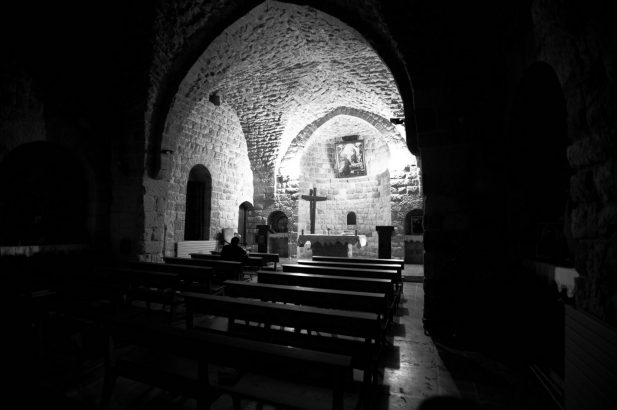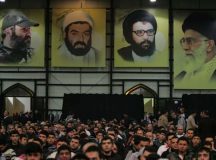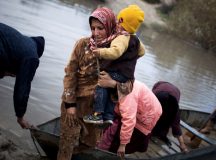Christians of the Middle East, whether free or captive to dhimmitude, have not readily identified with the travails and miseries of one another’s communities. That may all be changing, suggests Habib C. Malik.
In Lebanon we have always prided ourselves that the country, despite its legion woes and shortcomings, remains the freest and most open among Arab societies. Lebanon has also been the historic home to the Middle East’s freest and most deeply rooted Christian community. These Lebanese achievements do persist today, although both have been eroded since the start of the 1975-1990 war and the subsequent periods of Syrian occupation, Hezbollah ascendancy, and now an emerging Sunni backlash against the backdrop of regional turmoil. Someone like me who grew up in Lebanon during the 1960s and early 1970s was privileged to have experienced the country’s ‘golden age’ as it is now nostalgically referred to by many who are above 60. Marking that special period was a communal pluralism that was the envy of so many throughout the wider Arab world. Christians, Muslims, and Druze intermingled almost seamlessly at educational institutions, workplaces, leisure venues, and in commerce. To be sure there were political differences and even tensions at times when allegiances diverged and external connections took precedence over national priorities. However, before 1975, matters would return to normal following a passing crisis here or a short-lived confrontation there.
Even Lebanon’s Muslims began to take on a special character that set them apart from their coreligionists in the wider Arab milieu. Having lived for generations in close proximity with free and generally secure indigenous Christians, these Muslims gradually acquired the external trappings as well as the mindset of westernised locals. Subtle sociological transformations occurred mainly among educated urban Muslims in Lebanon that reinforced pluralist acceptance of diversity and promoted a live-and-let-live attitude with respect to those of differing creeds.
Lebanon’s Christians until the late 1960s had largely been blissfully oblivious to the winds of political radicalisation that were sweeping in first from Nasser’s Egypt and then from Arab quarters sympathetic to the Palestinians in their struggle with Israel—the country, after all, had for some decades become the unwitting host to several hundred thousand Palestinian refugees the vast majority of whom were Sunnis. These radicalising impulses were eventually to undergo a metamorphosis of their own as they became pronouncedly religious and sectarian. The 1979 Iranian revolution was followed by the emergence of Hezbollah as initially a homegrown response to the sustained marginalisation and neglect of Lebanon’s Shiite community throughout most of the 20th century, in parallel with the steady growth of Saudi Arabian political and financial clout in Lebanon. The 1989 Ta’if Agreement ended Lebanon’s protracted war in favor of the country’s Sunnis, and that subsequently brought onto the scene the late Rafiq Hariri as Riyadh’s point man in Lebanon. These developments unfolded against the backdrop of a tightening Syrian domination of Lebanon after 1976 when the Syrian army entered its tiny war-torn neighbor to the west.
Following Syria’s departure from Lebanon in 2005 it was only a matter of time before the showdown between Sunnis and Shiites would ignite, fueled as it has been by a region-wide confrontation along similar sectarian lines. Caught in these whirlwind developments, Lebanon’s Christians were steadily emasculated in both numbers and political influence. They now constitute one-third of the population, with the Shiites and Sunnis constituting the remaining two-thirds. . They are still freer than other Christians in the Middle East, and Lebanon continues to be the only Arab country whose elected president is a Christian.
The tendency historically among Arab Christians has been for those enjoying a greater margin of hard-won freedoms, namely Lebanon’s Christian community, to denigrate the dhimmitude* of the less free—essentially all the rest—who had succumbed to Islamic rule in past centuries and were never able to emerge from the second-class status to which they had been reduced. In a conversation I had recently with a Christian priest from Syria who had relocated to Lebanon, I was not surprised to hear him say that he had experienced firsthand this attitude of disdain from fellow Lebanese Maronite priests with whom he had studied in Rome some years back. At the monastery where he was residing there were all types of Christians from Eastern Europe and the Middle East. Naturally, he felt an affinity towards other Arab Christians at the monastery, but he quickly sensed from the Lebanese among them clear discrimination and felt purposely excluded from their circles. They basically looked down on him, or treated him with suspicion as possibly an informant for the regime. This instinctive caution of Lebanese Christians with respect to Syria’s Christians stems in part from regarding them as dhimmis, and as potential regime spies.
The Syrian priest told me that, in his view, Lebanese Christians, particularly the Maronites, consider Lebanon to be the only country in the region where they can live freely and ‘be like Europeans’ so it’s the case that ‘by losing Lebanon, the Lebanese Christian loses his identity.’ He added that this hitching of one’s spiritual identity to a geographic location and to all the experiences, good and bad, one has had there over time, is ‘a false approach,’ and the crux of the problem Lebanese Christians have with other Christians in the region.
I thought about what he said and admitted there was some truth in it. But matters are more complicated. Leading Christian Arab intellectuals last century—mainly Greek Orthodox, and mostly from Syria and the Palestinian diaspora —were at the forefront of championing virulent versions of Arab nationalism and Nasserism and Palestinian liberation while simultaneously embracing with uncritical abandon all the leftist ideological baggage that came with these charged packages. Their subliminal motives were purely dhimmi, i.e. the search for causes to which they and the Muslim majority could rally without drawing attention to any religious differences of the Christian-Muslim sort. Beleaguered minorities often resort to variations of this demeaning survival strategy. For Christians liberated from a dhimmi disposition like the Maronites, such postures can be profoundly offensive, and these free Christians do not hesitate to make this known whenever the opportunity arises. A related attitude emerged in Orthodox and other Eastern Church circles that stressed the distinctiveness and authenticity of ‘Oriental Christianity’ over against Christian importations from the West whether Protestant or Roman Catholic. This viewpoint rested on a perceived nefarious association between forms of Western Christianity and Western imperialism, both of which were to be rejected as illegitimate intruders into the pristine East where Christianity originated, and where the true Christians reside happily alongside their Muslim brothers. This too is a dhimmi construct intended to appease the Muslim majority through an outright repudiation of anything Western.
Tensions across the dhimmi-free divide among native Middle Eastern Christians are abundant and varied. They have acted over time to distance communities from one another, to foster stubborn prejudices, and to perpetuate misunderstandings. A great many of the acrimonious divisions separating Christian individuals and groups in our region resolve themselves in the last analysis to this bedrock existential divergence. Worst of all, these erected barriers rob people of any empathy they might otherwise have for the plight of others of their own kind as these others encounter hardships including life-and-death perils. Little was heard from Egypt’s Copts or Iraq’s Christians, for instance, during the long grim years of war in Lebanon as the embattled Christians there fought to preserve their freedoms. Not that those weaker and less free Christians could have done anything decisive to help their coreligionists in Lebanon, but even voices of lamentation in solidarity with the tormented were few and hardly audible. Dhimmi fear stifles all meaningful expressions of outrage thereby aborting any possibility of action. The sad fact is that the Christians of the Middle East, whether free or captive to dhimmitude, have not readily identified with the travails and miseries of one another’s communities.
However, since the launching of the misnamed Arab Spring this pattern of apathy, neglect, and helplessness may be starting to subside. The frequent church burnings and attacks on the Coptic community throughout Egypt during the successive phases of the Egyptian uprising, for example, were apprehensively followed by Christians in Lebanon and across the region. Bold articles were written in condemnation of these assaults, and local media devoted much airtime to these recurring abuses by extremists. The same has been true for Jihadi attacks on Christians in both Iraq and Syria. Most recently, the savage destruction by both the Nusra Front and the Islamic State in Iraq and Syria (ISIS) of Maaloula, Syria’s unique and ancient Aramaic-speaking Christian village, and the abduction for months of its elderly nuns, received sustained condemnatory coverage in regional Christian media outlets. Courageous statements were made by leading ecclesiastical prelates representing the entire spectrum of churches in the Middle East. Two bishops among these prelates were kidnapped by fanatic militants over a year ago and are still unaccounted for.
What happened to the Christians of Mosul in Iraq this past summer at the hands of ISIS (now calling itself the Islamic State) constitutes the return of a specter right out of the bloody annals of the early Islamic conquests. When Christians in the year 2014 are given the heartless choices of converting to Islam, paying a degrading dhimmi tax, leaving (and being stripped of all their portable and fixed possessions in the process) or, lastly, of dying by the sword, then no native Christian whether free or fettered can stand by or look the other way. Crises that affect so starkly the very survival of communities tend to dissolve lingering divides and act as unifiers—and this is certainly a crisis of such magnitude for the Middle East’s Christians, involving genocide and ethno-religious cleansing. The criminal choices given to Mosul’s Christians by these latter-day Takfiris are exactly what Lebanon’s free Christians have successfully fought against over the centuries and sacrificed so much to avoid. How can they bear to see them inflicted on other hapless Christians in neighboring countries?
Beirut’s importance for the region’s Christian communities has been its enduring openness, its stubborn freedoms, and its sympathetic cradling of pluralism. All these communities have established bishoprics and patriarchates in and around the greater Beirut area, and these ecclesiastical institutions have constituted windows on the world, for these often isolated and beleaguered communities. This fact alone makes the responsibility of Lebanon’s Christians, especially the Maronites, very great with respect to their besieged coreligionists throughout the Arab East. Lebanon is a tiny country with limited resources and mounting demands by refugees and a stagnant economy and endemic corruption within its political class. Its once-thriving middle class is today in tatters, and its impoverished masses are swelling with every new spillover from the Syrian conflict next door. If the state cannot easily offer sustained material support to the longsuffering displaced Christians that come knocking on its door, the local churches, led by the Maronite Patriarchate, can certainly do more than they have been and must continue to speak out passionately on behalf of these persecuted communities for the entire world to hear.
* Dhimmitude refers to the process of systematic reduction of Christians and Jews (People of the Book, as the Qur’an calls them) to second-class subordinate status involving a set of imposed restrictions, humiliating measures, and special taxes. Historically, the official Islamic justification for the dhimmi system has been that these communities must endure special restrictions as the price for being ‘protected’ under Muslim-majority rule and thereby allowed to practice their religions.






































Is there a reason you didn’t mention the Christians of Nazareth and their decision re-identify themselves as loyal members of the Jewish State?